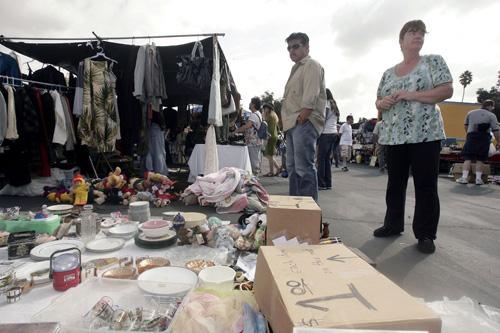Main Street residents hesitant to celebrate Congress’ bailout bill

Jill Dietsch, right, waits to assist shoppers at her booth at the Pasadena Flea Market on Sunday in Pasadena, Calif. Dietsch has slashed prices because of the slow economy. Ric Francis, The Associated Press
October 6, 2008
Relief on Wall Street over the hard-won passage of a $700 billion bailout package for the financial system apparently hasn’t yet trickled down to the pubs, storefronts, car lots and malls of Main Street.
Many Americans spent an uneasy weekend wondering whether the rescue would help in time – or at all – and trying to figure out where next to cut back as the economic screws tighten.
Would financing come through for the new washing machine? Could the old car hold out another year? Would a nice dinner out bust the budget?
“People are afraid,” said Linda Morrow, who owns a shoe and handbag store in a Dallas mall. “People basically don’t know what the future will bring. They’re afraid to spend. They want to see what the bailout will do. They’re waiting till after the election.”
In more than two dozen interviews with The Associated Press across the country over the weekend, Americans described those concerns, from tighter personal credit to worries about small businesses to doubts about simply making ends meet.
Get The Daily Illini in your inbox!
Matt Watson, a 41-year-old sales manager at a showroom of motorcycles and all-terrain vehicles in Morgantown, W.Va., said his family has cut back on dinners out and is buying more generic products.
The other day, he grabbed a $5 bill off his dresser and headed to a Walgreen’s drugstore for milk and bread.
“I could not buy milk and bread for $5,” Watson said, shaking his head in disbelief.
Aimee Robinson needs a $200,000 loan soon for her business, which sells eco-friendly furniture in Seattle, and wonders whether the bailout might ease the way. The interest rate on her store’s credit card just jumped to 17 percent from 8 percent.
“Everything came to a standstill” this summer, she said. “It hit me really, really bad.”
The bailout plan, quickly signed into law by President Bush after it passed the House by a comfortable margin Friday, will buy bad mortgage debt off the books of staggering banks in hopes of shoring up the American financial system.
It was put together during a harrowing three weeks for the U.S. economy that began with the bankruptcy of investment house Lehman Brothers and a government bailout of insurer American International Group.
The damage has seeped into far-flung corners of the economy. At a company called Tortilla Lady in Flagstaff, Ariz., five women make 1,500 to 1,800 dozen tortillas in an average week, some sold in the shop and others to stores.
For the week of Sept. 15, the week Lehman Brothers collapsed and the crisis took hold, production was only about 1,000 dozen.
“Once this really got into the news and people started understanding what Wall Street meant to them, they’ve become more conscious of their own budget and the limitation of their budget,” said Phebe Faus, an owner of Tortilla Lady.
An AP-GfK poll released last week before the House passed the revised bill found Americans divided on whether they supported the bailout. But a solid majority, eight in 10, said they feared the financial crisis would hit them directly. Many said they were conflicted, lamenting that taxpayers had to step in but believing something had to be done to prop up the economy.
Among that type of adherent is Morgan Cavanaugh, owner of a 75-year-old Irish pub that sits a few blocks from Lake Erie in downtown Cleveland. Standing behind the weathered mahogany bar, he said the bailout stinks.
“I don’t believe we should let them off the hook,” he said. “Either we pay now or we pay later. To me, it’s extortion.”
Associated Press writers Linda Stewart Ball, Felicia Fonseca, Kelli Kennedy, Page Ivey, Phuong Le, Joe Milicia, Todd Richmond, Michael Rubinkam, Vicki Smith, Amy Taxin and Catherine Tsai contributed to this report






